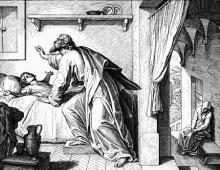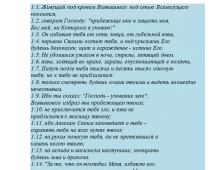Fable of the cat and the nightingale - Ivan Andreevich Krylov. The cat and the nightingale Fable the cat and the nightingale with accents
Cat and nightingale drawing
Fable The Cat and the Nightingale read text
The cat caught Nightingale,
She put her claws into the poor thing
And, squeezing him tenderly, she said:
"Nightingale, my soul!
I hear that you are praised everywhere for your songs
And they put them next to the best singers.
The godmother fox tells me,
That your voice is so ringing and wonderful,
What from your lovely songs
All the shepherds and shepherdesses are crazy.
I would really like to do it myself
Listen to you.
Don't tremble like that; don’t be, my friend, stubborn;
Don't be afraid: I don't want to eat you at all.
Just sing something to me: I will give you freedom
And I will let you walk through the groves and forests.
I am not inferior to you in love for music.
And often, purring to myself, I fall asleep.”
Meanwhile, my poor Nightingale
He could barely breathe in her claws.
“Well, what then?” continues the Cat, “
Sing, my friend, at least a little."
But our singer didn’t sing, he just squeaked.
“So this is how you admired the forests!”
She asked with a sneer.
Where is this purity and strength,
What is everyone talking about incessantly?
I'm bored by this kind of squeak from my kittens.
No, I see that you are not at all skilled in singing:
Everything without beginning, without end.
Let’s see how tasty you’ll be on your teeth!”
And ate the poor singer -
Down to the crumbs.
Should I speak my thoughts more clearly into your ear?
Thin songs to the Nightingale
In the claws of the Cat.
Moral of the fable The Cat and the Nightingale
Thin songs to the Nightingale
In the claws of the Cat.
Moral in your own words, the main idea and meaning of the fable The Cat and the Nightingale
When a person is limited, he cannot open up fully.
Analysis of the fable The Cat and the Nightingale
The fable was also written by Ivan Andreevich Krylov, it was released during a time of strict censorship by the authorities, however, the authorities are that same cat, and writers are like nightingales! The fabulist himself was no exception; at that time several of his fables were banned from publication!
The work points us to that picture so that we do not get caught up in the loud promises of power, otherwise we will be, like Krylov’s nightingale, appetizing and undernourished! The fable shows the confrontation between powerless writers and the powerful emperor of that time, Alexander the First! Yes, there were exceptions, some writers caved in and were considered: “Court poets.”
The authorities kill the talent in all writers by limiting them in themes, images, and preventing them from doing what they can do in freedom!
The fable came out only a year after it was written, all because of the same censorship invented by the authorities of the nineteenth century. Ivan Andreevich’s ironic attitude towards it, as Zhukovsky said, is a bald spot, and the inspector considered it bald, which was the reason for this work not being released to the public, but marinating for a year, until the severity of censorship in Russia at that time was reviewed!
The nightingale fell into the clutches of the cat. She asks him to sing, but he just squeaks. The cat ate it.
Heroes of the fable (characters)
- Cat
- Nightingale
Listen to Krylov's fable The Cat and the Nightingale
The cat caught Nightingale,
She put her claws into the poor thing
And, squeezing him tenderly, she said:
"Nightingale, my soul!
I hear that you are praised everywhere for your songs
And they put them next to the best singers.
The godmother fox tells me,
That your voice is so ringing and wonderful,
What from your lovely songs
All the shepherds and shepherdesses are crazy.
I would really like to do it myself
Listen to you.
Don't tremble like that; don’t be, my friend, stubborn;
Don't be afraid: I don't want to eat you at all.
Just sing something to me: I will give you freedom
And I will let you walk through the groves and forests.
I am not inferior to you in love for music.
And often, purring to myself, I fall asleep.”
Meanwhile, my poor Nightingale
He could barely breathe in her claws.
“Well, what then?” continues the Cat, “
Sing, my friend, at least a little."
But our singer didn’t sing, he just squeaked.
“So this is how you admired the forests!”
She asked with a sneer.
Where is this purity and strength,
What is everyone talking about incessantly?
I'm bored by this kind of squeak from my kittens.
No, I see that you are not at all skilled in singing:
Everything without beginning, without end.
Let’s see how tasty you’ll be on your teeth!”
And ate the poor singer -
Down to the crumbs.
Should I speak my thoughts more clearly into your ear?
Thin songs to the Nightingale
In the claws of the Cat.
Moral of the fable "The Cat and the Nightingale"
To understand the moral of the story about the cat and the nightingale, you need to remember the rules of the era in which the writer himself lived.
Under the rule of the kings, writers could not speak freely, and many areas of life were forbidden to be discussed. Writers, and ordinary people too, did not have such an important freedom as freedom of speech.
This is exactly what the author talks about in his fable, using the example of a nightingale to emphasize that, being limited in the freedom of creativity, poets and writers cannot fully express their talent. And it is impossible to create a work under duress if its creator lacks creative inspiration.
And besides, in the words of the fable, Krylov teaches us not to trust people too much if they have already abused their power or high position in the past, since they have every opportunity to break promises again.
First published in “Competitor of Education and Charity,” 1824. In the fable “The Cat and the Nightingale,” Krylov had in mind censorship. It is possible that the prohibition of such fables as “The Fish Dance” (remade by him on instructions from above) and “The Motley Sheep” (which remained unpublished) prompted Krylov to create the fable “The Cat and the Nightingale.” In 1823, a discussion took place on a new censorship charter (finally adopted in 1826), and for this purpose a special committee was established from members of the Scientific Committee under the leadership of M. L. Magnitsky (M. Sukhomlinov. Krylov’s ironic attitude towards censorship was also witnessed by curious his review, recorded by V. Zhukovsky: “Krylov talks about censorship: it is forbidden to let bald people into the room. There is a guard at the door. Those who are purely bald are not allowed to enter. - What to do with it? It’s bad for both the observer and the guest. And if the observer is a coward, then he will mistake the bald spot for baldness.”
CAT AND NIGHTINGALE
The cat caught Nightingale,
She put her claws into the poor thing
And, squeezing him tenderly, she said:
“Nightingale, my soul!
I hear that you are praised everywhere for your songs
And they put them next to the best singers.
The godmother fox tells me,
That your voice is so ringing and wonderful,
What from your lovely songs
All the shepherds and shepherdesses are crazy.
I would really like to, myself,
Listen to you.
Don't tremble like that; don’t be, my friend, stubborn;
Don't be afraid: I don't want to eat you at all.
Just sing something to me: I will give you freedom
And I will let you go for a walk through the groves and forests.
I am not inferior to you in love for music
And often, purring to myself, I fall asleep.”
Meanwhile, my poor Nightingale
He could barely breathe in her claws.
“Well, what then?” continues the Cat:
“Sing, my friend, at least a little.”
But our singer didn’t sing, he just squeaked.
“So this is why you admired the forests!”
She asked mockingly:
“Where is this purity and strength,
Who is everyone talking about incessantly?
I'm bored by this kind of squeak from my kittens.
No, I see that you are not at all skilled in singing:
Everything without beginning, without end,
Let’s see how tasty you’ll be on your teeth!”
And ate the poor singer -
Down to the crumbs.
Should I speak my thoughts more clearly into your ear?
Thin songs to the Nightingale
In the claws of the Cat.
Read by Igor Ilyinsky
Igor Vladimirovich Ilyinsky (July 11, 1901 - January 13, 1987) - Soviet actor, theater and film director, master of artistic expression (reader). People's Artist of the USSR.
Ivan Andreevich Krylov (February 2, 1769, Moscow - November 9, 1844, St. Petersburg) - Russian poet, fabulist, translator, employee of the Imperial Public Library, State Councilor, Full member of the Imperial Russian Academy (1811), ordinary academician of the Imperial Academy of Sciences in the Department Russian language and literature (1841).
In his youth, Krylov was known primarily as a satirist writer, publisher of the satirical magazine “Mail of Spirits” and the parody tragicomedy “Trumph”, which ridiculed Paul I. Krylov was the author of more than 200 fables from 1809 to 1843, they were published in nine parts and were reprinted in very large editions for those times. In 1842, his works were published in German translation. The plots of many fables go back to the works of Aesop and La Fontaine, although there are many original plots.
Many expressions from Krylov's fables have become popular expressions.
I. A. Krylov’s fables were set to music, for example, by A. G. Rubinstein - the fables “The Cuckoo and the Eagle”, “The Donkey and the Nightingale”, “The Dragonfly and the Ant”, “Quartet”.
The cat caught Nightingale,
She put her claws into the poor thing
And, squeezing him tenderly, she said:
“Nightingale, my soul!
I hear that you are praised everywhere for your songs
And they put them next to the best singers.
The godmother fox tells me,
That your voice is so ringing and wonderful,
What from your lovely songs
All the shepherds and shepherdesses are crazy.
I would really like to, myself,
Listen to you.
Don't tremble like that; don’t be, my friend, stubborn;
Don't be afraid: I don't want to eat you at all.
Just sing something to me: I will give you freedom
And I will let you go for a walk through the groves and forests.
I am not inferior to you in love for music
And often, purring to myself, I fall asleep.”
Meanwhile, my poor Nightingale
He could barely breathe in her claws.
“Well, what then?” continues the Cat:
“Sing, my friend, at least a little.”
But our singer didn’t sing, he just squeaked.
“So this is why you admired the forests!”
She asked mockingly:
“Where is this purity and strength,
Who is everyone talking about incessantly?
I'm bored by this kind of squeak from my kittens.
No, I see that you are not at all skilled in singing:
Everything without beginning, without end,
Let’s see how tasty you’ll be on your teeth!”
And ate the poor singer -
Down to the crumbs.
Should I speak my thoughts more clearly into your ear?
Thin songs to the Nightingale
In the claws of the Cat.
Analysis/moral of the fable “The Cat and the Nightingale” by Krylov
The work “The Cat and the Nightingale” by Ivan Andreevich Krylov first appeared in the collection of the “Free Society of Lovers of Russian Literature.”
The fable was created no later than 1823 (or at the end of 1822). Its author at this time is 55 years old, he is known as an original fabulist, his books are regularly published and translated into other languages. He also performs important work as an employee of the Public Library: he acts as a librarian, bibliographer, and collection collector. The genre is fable, the meter is free iambic with sweeping, adjacent and cross rhymes. The story begins dynamically. The bird is captured (a combination of inversion and enumerative gradation). Oxymoron: tenderly squeezing. Several addresses with diminutive suffixes of the most sugary kind on behalf of the cat: nightingale, friend. The cat plays with the bird as if it were a mouse. That’s the only reason she asks the Nightingale to sing and thus decide her fate. She enjoys the power of the predator over the prey. No amount of trilling would help the feathered hero. The cat justified her nature by the fact that, in her opinion, the glory of the Nightingale is exaggerated. She’s being disingenuous: she herself wouldn’t purr in a dog’s teeth. The tailed heroine simply laughs in the “poor singer’s” face. The godfox, such a music lover, is also not averse to eating a bird. Most likely, she praised the Cat not for the musical taste of the nightingale, but for the taste of its meat. Actually, isn’t that why a dish of nightingales’ tongues was invented in antiquity?.. In an allegorical sense, the writer’s arrows are directed against the power of censorship. I. Krylov also sometimes had to change the wording of highly social satires so that they would be accepted for publication. Let's say this happened with "Fish Dance". The plot and the conclusion from it are similar to popular expressions: the hawk kissed the hen to the last feather (proverb), if he speaks in a gentle voice, do not believe him (biblical parable of Solomon). Idiom: crazy. Irony: shepherds, shepherdesses (pastoral images), I will eat you (deliberately polite verb). Obsolete truncated form of the verb: tremble. Lexical repetition: barely. Colloquial expressive forms of words: just now, incessantly. Comparison of the Nightingale's singing with the squeaking of kittens. Thin - meaning weak, forced. The moral is reserved for the finale. The author doubts whether he is understood, and is ready to whisper “in the ear” of the reader (so that different Cats do not hear) the meaning of this drama.
Hypocrisy, feigned integrity and loyalty have repeatedly become themes in I. Krylov’s works.
One of Krylov’s most famous and satirical fables, “The Cat and the Nightingale,” was written under the influence of censorship and the ban of several works by the author himself. In the image of the Cat, power and censorship appear before us, and in the image of the Nightingale - the writer.
Fable The Cat and the Nightingale read
The cat caught Nightingale,
She put her claws into the poor thing
And, squeezing him tenderly, she said:
"Nightingale, my soul!
I hear that you are praised everywhere for your songs
And they put them next to the best singers.
The godmother fox tells me,
That your voice is so ringing and wonderful,
What from your lovely songs
All the shepherds and shepherdesses are crazy.
I would really like to do it myself
Listen to you.
Don't tremble like that; don’t be, my friend, stubborn;
Don't be afraid: I don't want to eat you at all.
Just sing something to me: I will give you freedom
And I will let you walk through the groves and forests.
I am not inferior to you in love for music.
And often, purring to myself, I fall asleep.”
Meanwhile, my poor Nightingale
He could barely breathe in her claws.
“Well, what then?” continues the Cat, “
Sing, my friend, at least a little."
But our singer didn’t sing, he just squeaked.
“So this is how you admired the forests!”
She asked with a sneer.
Where is this purity and strength,
What is everyone talking about incessantly?
I'm bored by this kind of squeak from my kittens.
No, I see that you are not at all skilled in singing:
Everything without beginning, without end.
Let’s see how tasty you’ll be on your teeth!”
And ate the poor singer -
Down to the crumbs.
Should I speak my thoughts more clearly into your ear?
Thin songs to the Nightingale
In the claws of the Cat.
Moral of the fable The Cat and the Nightingale
The main moral of Krylov’s fable “The Cat and the Nightingale” is directly revealed in the last lines. The second, not so obvious conclusion is addressed by Krylov to his fellow writers: “do not believe the promises of those in power, otherwise the fate of the boring and eaten Nightingale awaits you.”
Fable The Cat and the Nightingale - analysis
“The Cat and the Nightingale” is a rather transparent work, but of great importance for Krylov himself. By Nightingale we should understand many writers of that time who collaborated with the monarchy, taking the place assigned to them as “court poets,” and rejecting the then popular ideas of freedom. The cunning, strong cat is the personification of tsarism and Alexander I himself, an enlightened monarch who “took under his wing” many talented, but too progressive poets and writers.
Analysis of Krylov’s fable “The Cat and the Nightingale” comes down to the interaction of these two characters. The reader understands that the Cat, despite the promise, will eventually eat the Nightingale, even if he sings for her. At the same time, the frightened, driven Nightingale cannot reveal his talent, cannot sing the way he does in freedom.



